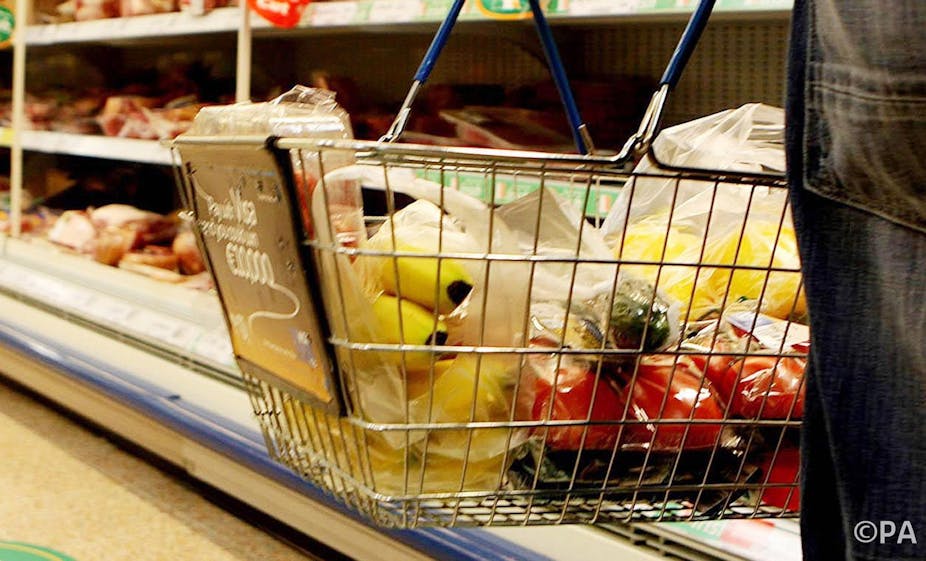The only things that seem to be really growing in the UK and US economies these days are hunger and food insecurity. The growth of food banks and other forms of hunger-relief charities is a strong reminder of the “pseudo-recovery” we are in and that the financial crisis hasn’t gone away.
This economic catastrophe was first shifted on to governments in the form of a sovereign debt crisis. With states now balancing their budgets through austerity measures, the crisis is mutating yet again, this time in the form of a growing subsistence crisis. And, as banks post record profits, another type of bank is thriving: the food bank.
More 13m people in the UK (about one in five) live below the poverty line. According to a recent survey for Tesco, the Trussell Trust and FareShare, a staggering 30% of UK adults have either skipped meals, gone without food to feed their family, or relied on relatives or friends for food during the last year. With growing numbers of people having to choose between heating and eating, food banks are reporting that increasing numbers of people are returning food items that need to be heated, as they cannot afford the associated energy cost.
The Trussell Trust, a charity dedicated to providing food in the UK, reported a 170% increase in the number of people who have turned to its food banks over the past 12 months. The number of people receiving a minimum of three days emergency food more than doubled between 2010-11 and 2011-12. The organisation helped 346,992 people in 2012-13, more than a third of which were children. To keep up with demand, the charity is launching three new food banks every week. It and now runs over 400 across the UK.
FareShare, a national charity that redistributes surplus food to local organisations, is also rapidly growing. In March it reported feeding 43,700 people a day through 910 local charities, a 26% increase on the previous year. Similarly, the Sikh Federation UK estimates it is serving around 5,000 meals to non-Sikhs each week.
In the US, the number of people without secure access to food has also increased in the wake of the crisis to 49m people, or 15.9% of the population. The number of participants in the new federal food stamp programme has increased from 17.2m in 2000 to 44.8m in 2011.
Children are particularly badly affected. In 2009, one fifth or more of the child population of 40 states and Washington DC lived in food insecure households. More than 31m children now receive free or reduced-price meals through the National School Lunch Program.
As in the UK, growing hunger in the US is largely being met through private charity rather than state economic policy. Feeding America – a nationwide network of member food banks and emergency kitchens – reports big increases in food bank usage since the crisis. It also reports that 36% of its clients were from households with one or more adults employed, illustrating the dire reality of labour market restructuring. Again, just as in the UK, many food insecure households reported having to choose between food and other necessities, such as paying for utilities, heating fuel, or rent.
In these and other advanced capitalist societies, the rise of hunger is closely related to the growing numbers of the working poor – or those who are employed but still unable to meet basic needs. By 2009 in the US, nearly one in three working families were defined as “low income”. For these families, unexpected expenses, sickness or temporary unemployment are sufficient to shake dramatically an already fragile financial situation.
Many states are experiencing a fiscal crisis, with increasing pressure to enact policies that will reduce overall spending in social security and nutritional programmes. But this is happening at the precise time when the demand for, and therefore the costs of, such programmes are rising. These measures will entrench poverty and hunger even further.
While benefit delays, rising living costs and benefit changes are often named as the causes behind the surge in the number of people turning to food banks, high food prices and reduced benefit payments do not constitute a crisis in and of themselves. The root cause of rising hunger amid plenty lies in stagnant and declining real wages, unemployment and underemployment.
The displacement of the 2008 financial crisis on to governments represents a financial coup d’état, the consequence of which is that more and more of our relatives, friends and neighbours are paying an unacceptable price – being hungry and experiencing heightened food insecurity. We need a strong interventionist state that can implement social and economic reforms capable of transforming the minimum wage into a living rather than a poverty wage, combating unemployment and underemployment, and reinforcing and expanding the social safety net.
With nearly 870m people suffering from chronic hunger globally, growing food insecurity in advanced capitalist countries highlights the uneven, yet global, nature of the current subsistence crisis. Wall Street has made it extremely clear that it will not pay for the economic crisis it created. We too must refuse to pay the bill through poverty and hunger. As A. Haroon Akram-Lodhi has convincingly argued, people are hungry for change.
This article first appeared on SPERI Comment – part of the Sheffield Political Economy Research Insitute’s website.

